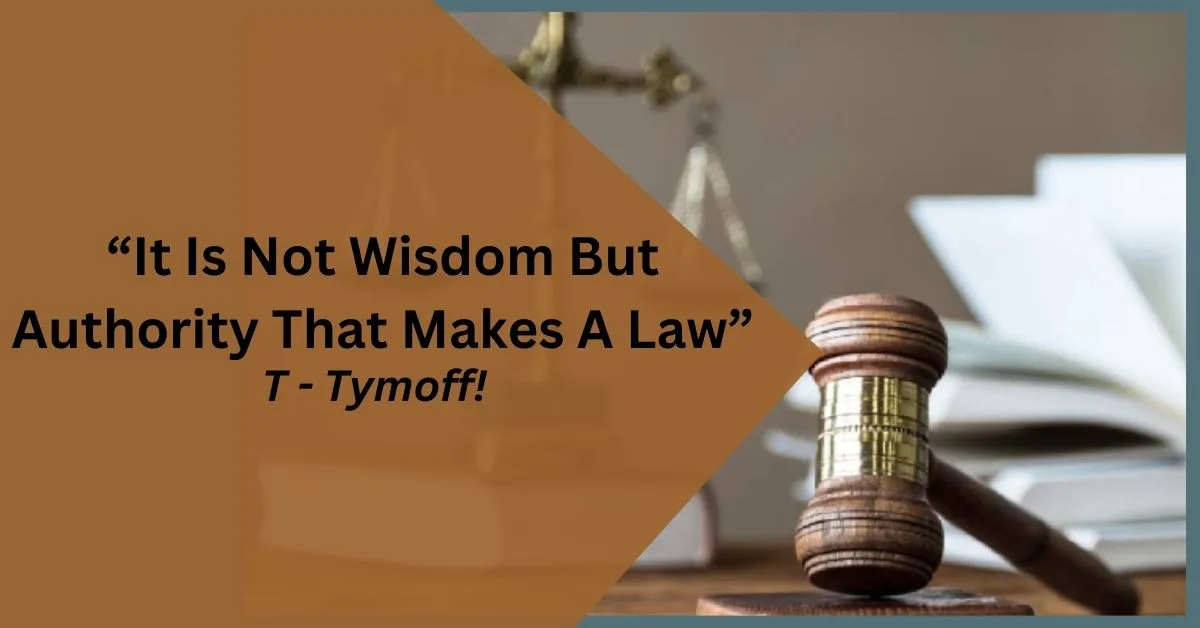Introduction
it is not wisdom but authority that makes a law. t – tymoff In the realm of law and governance, the interplay between wisdom and authority has long been a subject of contemplation. The quote by Tymoff, “It is not wisdom but authority that makes a law,” encapsulates this complex relationship, inviting us to delve deeper into the dynamics shaping legal systems worldwide.
The Difference Between Wisdom and Authority
Defining Wisdom
Wisdom encompasses a nuanced it is not wisdom but authority that makes a law. t – tymoff understanding of principles, values, and consequences. It involves discernment, foresight, and a deep appreciation for the complexities of human society.
Defining Authority
Authority, on the other hand, refers to the power vested in individuals or institutions to enforce rules and make decisions. It often derives from positions of leadership, tradition, or legal mandate.
The Role of Wisdom in Lawmaking
Wisdom serves as a guiding light in the formulation of laws. It prompts lawmakers to consider the long-term implications of their actions, the needs of diverse communities, and the fundamental principles of justice it is not wisdom but authority that makes a law. t – tymoff.
Wisdom as a Guiding Principle
Laws rooted in wisdom reflect a commitment to fairness, equity, and ethical conduct. They prioritize the common good over narrow interests, aiming to create a society where all individuals can thrive.
The Importance of Informed Decision-Making

Wisdom in lawmaking it is not wisdom but authority that makes a law. t – tymoff entails thorough research, consultation with experts, and a willingness to listen to diverse perspectives. It acknowledges the complexity of social issues and seeks solutions that are both effective and just.
The Role of Authority in Lawmaking
Authority plays a pivotal role in the enactment and enforcement of laws. It provides the necessary structure and legitimacy for governance, ensuring order and stability within society.
Authority as a Source of Power
The authority vested in lawmakers, government agencies, and judicial bodies empowers them to establish rules, resolve disputes, and maintain public order. It is essential for upholding the rule of law and safeguarding individual rights.
The Influence of Authority on Legislation
However, the concentration of authority can also lead to abuses of power, arbitrary decision-making, and the erosion of democratic principles. When unchecked, authority may prioritize self-interest or partisan agendas over the common good.
The Balance Between Wisdom and Authority
Achieving a balance between wisdom and authority is paramount for the legitimacy and effectiveness of legal systems.
Striking a Balance for Effective Governance
A balanced approach to lawmaking it is not wisdom but authority that makes a law. t – tymoff requires a judicious blend of wisdom and authority. It involves harnessing the insights of wise counsel while respecting the mandates of duly constituted institutions.
Examples of Balanced Legal Systems
Countries with robust legal frameworks often exemplify this balance, integrating principles of justice, accountability, and democratic participation. These systems strive to uphold the rule of law while promoting social cohesion and individual liberties.
Case Studies
Historical Examples of Laws Based on Wisdom
Throughout history, we find examples of laws inspired by wisdom, such as the Magna Carta, it is not wisdom but authority that makes a law. t – tymoff which laid the foundation for constitutional governance and the protection of individual rights.
Instances Where Authority Overshadowed Wisdom in Legislation
Conversely, there are instances where authority has eclipsed wisdom in lawmaking, leading to oppression, injustice, and social unrest. These cases underscore the perils of unchecked power and the importance of democratic checks and balances.
Implications for Modern Society
In today’s complex and rapidly evolving world, the tension between wisdom and authority poses significant challenges for policymakers and citizens alike.
Lessons for Contemporary Lawmaking
By reflecting on the lessons of history and embracing inclusive, deliberative processes, modern societies can navigate the it is not wisdom but authority that makes a law. t – tymoff complexities of governance more effectively. This requires a commitment to transparency, accountability, and the pursuit of the common good.
Challenges in Maintaining the Balance
However, maintaining the balance between wisdom and authority is no easy task. In an era marked by polarization, misinformation, and rapid technological change, policymakers must remain vigilant against threats to democratic norms and the rule of law.
Conclusion
In conclusion, the quote by it is not wisdom but authority that makes a law. t – tymoffinvites us to reconsider the foundations of our legal systems and the values that underpin them. While authority is essential for governance, it is wisdom that ultimately guides us toward justice, fairness, and the common good.
